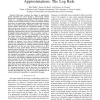Free Online Productivity Tools
i2Speak
i2Symbol
i2OCR
iTex2Img
iWeb2Print
iWeb2Shot
i2Type
iPdf2Split
iPdf2Merge
i2Bopomofo
i2Arabic
i2Style
i2Image
i2PDF
iLatex2Rtf
Sci2ools
116
click to vote
INFOCOM
2009
IEEE
2009
IEEE
Delay-Optimal Opportunistic Scheduling and Approximations: The Log Rule
—This paper considers the design of opportunistic packet schedulers for users sharing a time-varying wireless channel from the performance and the robustness points of view. Firstly, for a simplified model falling in the classical Markov decision process framework where arrival and channel statistics are known, we numerically compute and evaluate the characteristics of mean-delay-optimal scheduling policies. The computed policies exhibit radial sum-rate monotonicity (RSM), i.e., when users’ queues grow linearly (i.e. scaled up by a constant), the scheduler allocates service in a manner that de-emphasizes the balancing of unequal queues in favor of maximizing current system throughput (being opportunistic). This is in sharp contrast to previously proposed policies, e.g., MaxWeight and Exp rule. The latter, however, are throughput-optimal, in that without knowledge of arrival/channel statistics they achieve stability if at all feasible. To meet performance and robustness objectives,...
| Added | 24 May 2010 |
| Updated | 24 May 2010 |
| Type | Conference |
| Year | 2009 |
| Where | INFOCOM |
| Authors | Bilal Sadiq, Seung Jun Baek, Gustavo de Veciana |
Comments (0)

